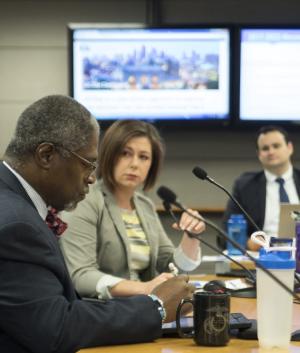How Kansas City cemented data-driven management into city law

It’s a fear shared by public-sector innovators everywhere: You’ve accomplished something big — and perhaps even started to shift the culture in City Hall in a positive way — and then leadership changes, priorities change, and your work is all but forgotten.
But in Kansas City, Mo., a city heralded for its success in using data to make decisions, measure results, and hold leaders accountable, it’s a fear that’s unlikely to become reality. That’s because the city last month passed an ordinance that bakes these practices into city law.
The new law codifies much of Kansas City’s approach to data as voters prepare to elect a new mayor—and as Mayor Sly James reaches his term limit—later this year. Future city leaders will be obliged to continue a robust system for reporting data on the city’s performance.
Alongside the new law, Kansas City also took steps to formalize the role of the scrappy team that’s been leading the city’s data work for years. Most visibly, they changed their name from the Office of Performance Management to something snappier — DataKC. They also defined the scope of services they’re offering departments as City Hall’s in-house data experts.
Bloomberg Cities spoke with DataKC’s Julie Steenson and Kate Bender to find out more about the big changes in Kansas City and what other cities can learn from them.
Bloomberg Cities: What does Kansas City’s new data ordinance do?
Julie Steenson: The ordinance requires the city manager to develop and maintain an infrastructure for data reporting. Our KCStat program [where Mayor James and City Manager Troy Schulte sit down with department heads in public and assess whether they’re hitting their goals] is actually wrapped around the citywide business plan. And the citywide business plan is required by the city charter, but there wasn’t any language about reporting on it or being accountable to the public.
The ordinance closes that gap. It doesn’t codify KCStat itself. But it codifies the necessity of a transparent and accountable way of reporting progress on the city’s priorities, and specifically the citywide business plan. It also says the city council at any time can ask for a data report from the city manager.
Embedded in the ordinance is the notion that some kind of infrastructure must be present to do data work — whether it’s people or online dashboarding or a robot. We didn’t want to lock future leaders into just the system we created. We wanted it to have flexibility. It can look different than what we have now. But the spirit of leading and managing with data is embedded in there, and also the need to have transparency of city operations through data and data storytelling.
Why is the ordinance such a big deal?
Kate Bender: We have spent such a long time here working toward a culture of data-driven management, both on the staff level and with elected officials. A lot of that culture lives in people, and some of it has come to live in institutions.
[Read: Data-driven women to watch]
But with changes in leadership coming, we’ve homed in on this question of what else can we do to support those people and those institutions so that the organization itself is officially embracing data-driven change? It’s not a for-sure thing when it lives with people and institutions.
So for us to have that public statement that the city cares enough about that to put it into an ordinance, it means we are holding our own feet to the fire as an organization. We are saying as a public statement to all future leadership that we have made this commitment to ourselves for the long term.
Along with the ordinance, you’ve made some internal changes, like rebranding the Office of Performance Management as DataKC. What are those changes all about?
Steenson: We needed to formalize some of the things we were doing, both in our identity and in our scope of work. The genesis of our office was we came out of the 311 call center and evolved organically over time. It wasn’t like in some of our peer cities where offices like ours were created at once with some fanfare and a bit more intentionality about it.
We evolved holistically over time and based on the needs of the organization. So, when the organization needed help with process improvement, we went out and got ourselves trained in process improvement. When there was a need for survey administration, we taught ourselves survey administration. Because we evolved, we never really sat down and talked about what are our goals with data? What are we trying to provide to the city?
The red flag for us was that over time people, especially externally, would ask: “What is it you do for the city?” And none of us had a good, solid, succinct elevator pitch. It was, “Well, we do data for the city,” or “You know, performance metrics!” We just didn’t have a pitch. So part of our scoping was to understand and identify what we think we do.
How did you do that?
Steenson: We did a lot of work with Results For America, walking through an exercise where we identified our customers, who were the primary stakeholders we need to engage, and who are more external audiences. It took the better part of a year.
The name change and rebranding was not the primary goal. We were really after the documentation of the scope and formalizing what our office could provide. But as we started going through it, even some of our internal champions said they didn’t really know what the title “Office of Performance Management” meant. We circled around a number of different names until we came up with DataKC, because it’s super clear. We do data. For KC. That’s what it is. And we user-tested that and our scope of services with some internal stakeholders and felt pretty confident about it.
[Read: The mayor behind Kansas City’s data revolution]
It’s culminated now into the passing of this ordinance. Part of our scope was to sustain the data principles we’ve been working under. We will definitely get a new mayor in a few months, and if we get a new city manager, we wanted it to be sustainable — to say that data is not just Mayor James’ initiative, it’s not just City Manager Troy Schulte’s initiative, this is how the city does business.
Why was developing a scope of services important?
Bender: We do a lot of training with departments, for example, but people are always coming back to us with requests. “I know you taught this in your class, but would you mind coming out and doing a process map with our group?” Or, “I’ve got this survey, I just would like another set of eyes on it.” And it’s always been our approach to say: “Of course — we’re a resource.”
But there’s not a clear awareness across the organization of the resource we’re trying to be. Because we’ve just built all these informal relationships, and we’ve relied on that to bring us into conversations. We need to be more explicit about who we are and what purpose we serve, and the value we’re looking to provide. That’s where we focused on developing this scope of services.
Another benefit to us was clarity. Our team has grown person-by-person, iteratively. We have been strategic about the work we’ve added, but we added it in chunks and not always with a process to go with it. With four analysts, and an administrative staff and a team lead, at times we do step on each other. This helps us have more clarity about how we’re using our resources, have clear ownership, and be able to report out how many projects we’ve worked on or departments we’ve interacted with.
And what’s in that scope of services?
Bender: We looked at what work we already had been doing with departments and turned it into a menu. There are two buckets of work.
One is citywide work, which you could think of as commissioned by the city manager and city council. That’s the public reporting on the citywide business plan, which is KCStat. It’s running our citywide surveys. It’s overseeing open data. It’s things that relate to data at a citywide level that need an owner.
And the other bucket is what we call the scope of services. That’s consulting with individual departments, or across multiple departments, on their projects. We have four general categories we work with departments on: customer feedback, managing with data, continuous improvement, and data storytelling.
[Read: 9 Ways cities can use data for results]
For example, we have a couple of projects going on now with our municipal court. We’re redesigning their summons letter and running a random-control trial. So that’s a continuous improvement effort. We’re also working with them on customer feedback and storytelling. They’re looking to get feedback from their customer base, and we’ve helped them use our resident survey to paint a picture of who their users are.
You’ve clearly got an eye on the leadership change coming. Why is leadership so important when it comes to this sort of data work in government?
Bender: Leadership is crucial. If you don’t have explicit executive leadership who’s going to dedicate themselves to these conversations, it’s difficult to develop a meaningful program. And on one hand, we have no control over that.
On the other hand, both elected and appointed officials react to the organization’s priorities. And that’s why the ordinance is important, is because it explicitly states that this is a priority of this organization. It requires some element of leadership involvement. It’s not that a future city manager has to get down into the weeds as much as our current one does. It’s more that a future city manager will need to understand the importance of somebody getting down in the weeds.
What lessons can other cities take away from Kansas City?
Bender: For us, it made a lot of sense for the ordinance to follow the other work we had done. By the time we got to the ordinance, it was almost a routine thing. There was no controversy on the City Council — no “What’s this?” or “I don’t understand this.” Data work is so accepted here. The timing was right. We’d built so much internal support that the ordinance didn’t have to carry a lot of water. It was sort of capping things off.
Steenson: We already have the infrastructure and the pieces and the people doing this work. When we told the Council that this ordinance was a codification of the work we’ve been doing — they already knew what that was.
A lesson learned is that it’s good to have some proof that what you’re doing has made a difference. I wouldn’t go in as a new mayor or new city administrator and just drop this ordinance on a table without any kind of proof that it works as a system.





